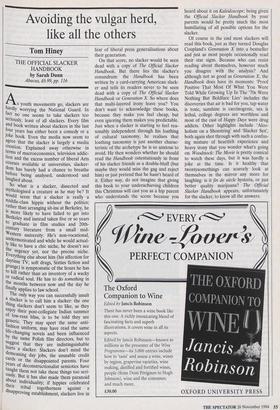Avoiding the vulgar herd, like all the others
Tom Hiney
THE OFFICIAL SLACKER HANDBOOK by Sarah Dunn Abacus, f6.99, pp. 116 As youth movements go, slackers are hardly worrying the National Guard. In fact no one seems to take slackers too seriously, least of all slackers. Every film and book written about slackers in the last four years has either been a comedy or a Joke book. Even the media now seem to agree that the slacker is largely a media creation. Explained away otherwise in terms of macroeconomics, television addic- tion and the excess number of liberal Arts courses available at universities, slacker- dom has barely had a chance to breathe before being analysed, understood and laughed about. So what is a slacker, dissected and mythologised a creature as he may be? It would seem that a slacker is really a middle-class hippie without the politics; rather than arranging sit-ins at Berkeley, he 's more likely to have failed to get into Berkeley and instead taken five or so years to graduate in film studies and 20th- century literature from a small mid- Western university. He's non-vocational, undermotivated and while he would actual- ly like to have a chic niche, he doesn't see the urgency yet, nor the precise niche. Everything else about him (his affection for daytime TV, soft drugs, Sixties fiction and grunge) is symptomatic of the hours he has to kill rather than an inventory of a wacky or radical soul. He has to do something in the months between now and the day he finally applies to law school. The only way you can successfully insult a slacker is to call him a slacker: the one thing slackers don't seem to like, as they enjoy their post-collegiate Indian summer of low-rent bliss, is to be told they are generic. They may sport the same anti- fashion uniform, may have read the same life changingnovels and been influenced by the same Polish film directors, but to suggest that they are indistinguishable hurts a slacker. Slackers don't mind the demeaning day jobs, the unusable credit cards or the disappointed parents. Four years of deconstructionalist semiotics have taught them not take these things too seri- ously. But it has also made them paranoid about individuality; if hippies celebrated their tribal togetherness against a disapproving establishment, slackers live in fear of liberal press generalisations about their generation. On that score, no slacker would be seen dead with a copy of The Official Slacker Handbook. But there lies the slacker's conundrum: the Handbook has been written by a card-carrying American slack- er and tells its readers never to be seen dead with a copy of The Official Slacker Handbook or Generation X. So where does that multi-layered irony leave you? You don't want to acknowledge these books, because they make you feel cheap, but even ignoring them makes you predictable. Just when a slacker is starting to feel rea- sonably independent through his loathing of cultural taxonomy, he realises that loathing taxonomy is just another charac- teristic of the archetype he is so anxious to avoid. He then wonders whether he should read the Handbook ostentatiously in front of his slacker friends as a double-bluff (but maybe they would miss the gag and reject him) or just pretend that he hasn't heard of it. Either way, do not imagine that giving this book to your underachieving children this Christmas will cast you as a hip parent who understands the scene because you heard about it on Kaleidoscope; being given the Official Slacker cial Slacr Handbook by your parents would be pretty much the most humiliating of all possible options for the slacker.
Of course in the end most slackers will read this book, just as they turned Douglas Coupland's Generation X into a bestseller and just as most people occasionally read their star signs. Because who can resist reading about themselves, however much you disagree with the analysis? And although not as good as Generation X, the Handbook does have its moments: Proof Positive That Most Of What You Were Told While Growing Up In The '70s Were Nothing But Boldface Lies' includes the discoveries that air is bad for you, tap water is toxic, sunshine is carcinogenic, sex is lethal, college degrees are worthless and most of the cast of Happy Days were drug addicts. Other highlights include `Alco- holism on a Shoestring' and 'Slacker Sex', both again shot through with such a confus- ing mixture of heartfelt experience and heavy irony that you wonder what's going on. Woodstock: The Movie is pretty comical to watch these days, but it was hardly a joke at the time. Is it healthy that twentysomethings can scarcely look at themselves in the mirror any more for laughing: is it fin de siecle hysteria, or just better quality marijuana? The Official Slacker Handbook appears, unfortunately for the slacker, to know all the answers.










































































 Previous page
Previous page